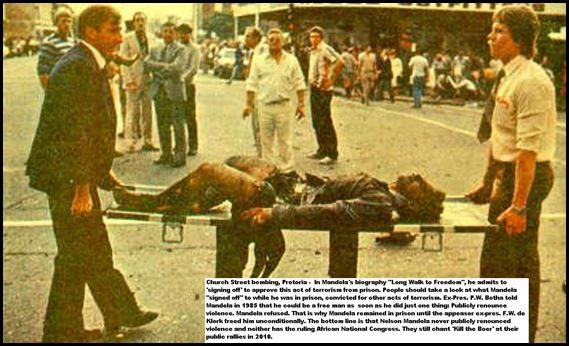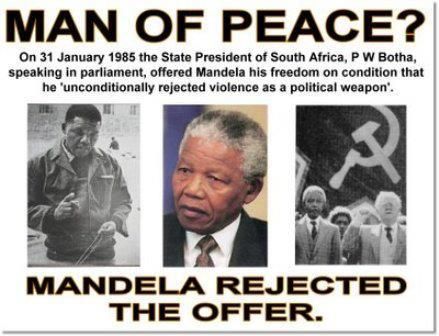Apart from the stories about plaasmoorde, they were told by white locals of stringent rules regarding the hiring of people, in that if you're a small business owner looking for an extra hand, the first person you hire MUST be a black. They saw the gated communities for themselves.
And they were told something else, by a formerly Belgian lady of middle age, a native from the region around Ninove (a small town 25 kloms west of Brussels).
This lady is now planning to come back for good - the situation, she said, is becoming too insecure.
The lady said that among blacks there is widespread talk of killing as many whites as possible the day Mandela dies.
Think about that the day the old communist monster dies. Don't cry along with the wolves - There will be enough crying all right. You can be sure all over the West, among our politically correct elites, eaten, no, devoured by white guilt, and brainwashed by decades of false information, there will be the typical handwringing, crocodile tears and 'fitting' eulogies about what a 'great statesman' Nelson Mandela was.
Think instead of the millions of white South Africans who will live in fear of getting killed that day, those who lifted the country up till it was Africa's jewel, those who transformed it into an economic powerhouse of the first order, boasting half of all the railroads on the entire continent. Indeed, thanks to the Afrikaners, blacks enjoyed a far higher standard of living than in virtually every other African country.
Was Apartheid good? It was not, of course. And it should have been abolished. But in time, when the country was ready for it and sufficient competent black cadres would have been available.
As for the communist scoundrel Mandela, personally I see not a single reason to glorify him. He was a terrorist who was tried for, and convicted of, terrorist activities with the express aim of plunging the country into a bloody civil war. He was the driving force behind the terrorist organization Umkhonto we Sizwe (Spear of the Nation), the armed wing of the ANC, which in the course of its bloody history was responsible for, amongst others:
a.) the 1983 “Church Street Bombing”, which claimed 19 dead (a good part of them black!) and wounded 217 others.
b.) the bombing of a shopping centre in Amanzimtoti, which killed 5 people (three of them children) and wounded 40.
c.) 'Magoo's Bar Bombing': three dead, 10 wounded
d.) an attack on Johannesburg Court
e.) an attack on a Newcastle Court (24 wounded)
f.) hundreds of other, smaller attacks

Nelson Mandela, the communist killer, served his time on Robbeneiland and in other prisons, and it was well deserved.
Check out an account of Mandela's trial here:
The next day at the Palace of Justice in Pretoria, in a segregated courtroom filled on one side with plain-clothed police officers and on the other side with relatives and friends of the accused, prosecutor Percy Yutar called the case of "State versus the National High Command and Others." He then produced an indictment charging the eleven defendants with two counts of sabotage and two counts of conspiracy. The defense, noting that they were just then seeing the indictment for the first time, asked Justice Quartus de Wet for a postponement. De Wet gave the defense three weeks to prepare for trial.
When court reconvened three weeks later, Nelson Mandela led the parade of defendants up a staircase that opened into the center of the court, where a specially constructed dock had been built. Mandela gave the clenched fist salute to supporters that had become an ANC trademark. Mandela shouted, "Amandla!" (Power), and the crowd responded with the cry, "Ngawethu!" (It shall be ours).
Defense attorney Bram Fischer led off the proceedings with an attack on the sufficiency of the indictment. He argued that the charges were vague, and failed to provide any indication as to which defendants carried out which alleged acts of sabotage. Instead, the government's indictment simply stated that details concerning the sabotage were "peculiarly within the knowledge of the accused." Justice de Wet, in his flowing red robes beneath a wooden canopy, found the defense arguments convincing. He told Yutar that the indictment seemed to presuppose guilt and provided almost no clue as to the nature of the offenses. The indictment, Justice de Wet announced, must be quashed. Got off guard, security officials rushed to re-arrest each of the defendants--except one. Yutar salvaged some favorable publicity for the prosecution by announcing that charges would be dropped against Bob Hepple and that he would be the state's first witness.
In December, the remaining defendants were back in court to hear Yutar read the state's new charges. The defendants were accused of sabotage, ordering munitions, recruiting young men for guerrilla warfare, encouraging invasion for foreign military units, and conspiring to obtain funds for revolution from foreign states. The first accused, Nelson Mandela plead not guilty: "My Lord, it it not I, but the government that should be in the dock. I plead not not guilty." Each of the other defendants in turn entered not guilty pleas as well. Yutar delivered the opening statement for the prosecution:
The accused deliberately and maliciously plotted and engineered the commission of acts of violence and destruction throughout the country. The planned purpose thereof was to bring about in the Republic of South Africa chaos, disorder and turmoil, which would be aggravated, according to their plan, by the operation of thousands of trained guerrilla warfare units deployed throughout the country at various vantage points....Their combined operations were planned to lead to confusion, violent insurrection and rebellion, followed, at the appropriate juncture, by an armed invasion of the country by military units of foreign powers. In the midst of the resulting chaos, turmoil and disorder, it was planned by the accused to set up a provisional revolutionary government to take over the administration and control of this country...
Listening to Yutar's address, defense attorneys realized (as Joel Joffe later recounted in his book, The State vs. Nelson Mandela: The Trial That Changed South Africa) that "for most of the accused the only possible verdict was 'guilty.' The case was therefore, as far as we were concerned, a battle to prevent the death penalty from being carried out." The defendants had other goals, however. Many of them saw the trial as the first and last opportunity to explain to the nation why they felt compelled to do what they did for the sake of South Africa's oppressed.
The first prosecution witness would not be, as earlier promised by Yutar, Bob Hepple. Bob Hepple had fled the country. From the safety of Kenya, Hepple told reporters that he never had any intention of testifying against the defendants, whose aims he shared.
Instead, the star witness for the prosecution was Bruno Mtolo (known in court as "Mr. X"), a former Umkhonto we Sizwe saboteur. Mtolo told the court that, on orders from the National High Command, he had blown up a municipal office, a power pylon, and an electricity line. He testified that Mandela had given his Natal region MK comrades a pep-talk about their underground missions. He described the workings of bombs, grenades, land mines, and other weapons used by MK saboteurs. Mtolo also testified that he believed that the ANC and MK had become instruments of the Communist Party. He explained that financial and family reasons led him to abandon Umkhonto we Sizwe:
Mtolo: They kept promising that I would be paid, and they were still making promises long after I had given all hope of ever getting anything from them. They didn’t care about me nor about the others, the recruits who were arrested.
Yutar: Who did not care about them?
Mtolo: The High Command.
Mtolo's betrayal confused Mandela and the other defendants. In his autobiography, Long Walk to Freedom, Mandela wrote he was especially upset with Mtolo's willingness to implicate underground activists who were not charged in the case. Mandela considered this "inexcusable."
The other critical piece in the prosecution case was Umkhonto we Sizwe's six-page plan of action, called "Operation Mayibuye," confiscated in the Rivonia raid. The state contended the plan, which called for guerrilla warfare and an invasion of South Africa by supporting foreign military units, had been approved by the ANC executive and was the operating plan of Umkhonto we Sizwe. The defense, on the other hand, contended that Operation Mayibuye was just a draft of a possible plan of action and had not been approved by either MK or the ANC executive. In fact, the defense would argue, many of the defendants (including Nelson Mandela) believed the document to be "entirely unrealistic in its goals and plans."
Yutar produced other damning documents, many of which he read dramatically in court. A document marked "Top Secret," in the handwriting of Goldreich and found at Rivonia, discussed "revolution" and mentioned possible support from people in the USSR, China, Germany, and Yugoslavia, among other countries. Methods of obtaining weapons, including explosives, were outlined in some detail. Documents such as these shocked many trial observers, but the defendants largely viewed their production with indifference--the defendants were ready to admit they talked openly about sabotage and armed struggle.
On the small photo to the right, below, you see the proud author of 'How to be a good communist', flanked by another commie scumbag, Joe Slovo.

Think of what the old monster REALLY stood for when he croaks, and pray for White South Africans that day.
MFBB.